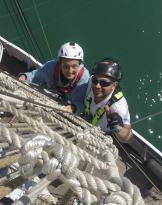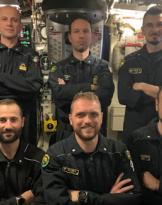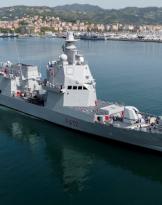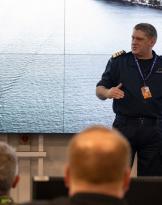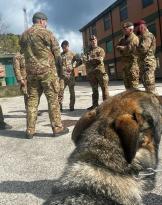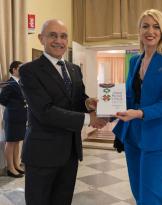Taking into consideration the dynamics and the problems that this phenomenon creates to the maritime world and in particular to the mercantile marine, during the Conference the different aspects of this emergency have been addressed with particular attention to the difficulties that the crews of merchant ships find themselves. despite, to face when they intervene in the rescue of migrants who risk their lives in the waters of the Mediterranean.
In the first part of the day moderated by Renato Causa, Fr. René Manenti, of the CSER, introduced the works with a report on the migratory flows of the Mediterranean, highlighting how much they are linked to the nature of man and that the analysis can help to dispelling myths and fears, bringing public opinion back to a more just evaluation of the phenomenon.
The professor. adv. Mario Carta, professor of EU law, Unitelma Sapienza has outlined the framework of the norms of international law in which the rescue at sea is framed, highlighting the delicate relationship existing between the rules dedicated to the protection of migrants at sea, also in asylum seekers and refugees, and the need to combat the criminal activities of traffickers, the source of huge and illicit earnings.
The experience of crews of merchant units that were called to help migrants was told by Raffaele of France, operation manager of the Augusta Due Srl Company, stressed how to deal with the humanitarian emergency in the Mediterranean throughout the 2014 and in the first months of the 2015 the merchant ships have been called more and more often with serious risks for their crews as well as with significant economic losses completely borne by the shipowner.
His testimony was joined by that of Admiral Felice Angrisano, present at the meeting and who spoke of an obligation of the heart, that imperative to save lives when there is no time to verify the risk of contagion or the validity of documents of migrants, occupants of barges who should not sail, without crew or equipment. He highlighted, finally, the "reckless" use of the Merchant Marine in the recent rescue operations, which came to be in rescues at sea, according to data emerged at the conference, even greater than the contribution of the Coast Guard.
During the Round Table coordinated by Fr. Gabriele Beltrami, Luca Sisto, Confitarma's Transport Policy chief, recalled that in the 2014, out of a total of around 170.000 migrants, about 42.000 merchant ships were saved by 254, of which Italian 170, while in the early months of the 2015 the about 100 merchant ships called to the rescue have saved more than 12.100 people.
The com.te Francesco Paolo Serretiello, ITF Italia inspector. he said that along with positive and concrete actions in support of piracy, now is the time to work together for this, which has increasingly become an ordinary emergency involving the merchant marine.
Father Bruno Ciceri, both in his speech and in concluding the work of the day, underlined how the advantages in embarking on an undeniable maritime career are traditionally balanced by certain difficulties and peculiar problems: the distance from one's social and family environment to many months; the sometimes dramatic experience of confrontation with the forces of nature; the dangers of piracy, in addition to the recent and continuous rescue and rescue operations at sea. The crew of commercial ships that are completely inadequate for rescuing hundreds of people at a time does not receive any preparatory exercise for this task and this leads to situations of very strong physical and psychological stress, for which emotional assistance is required. civil recognition.
The Day of Seafarers is a reality more than worthy of note and deepening for the quantity of people involved and incidence in the Mare Nostrum area.
Source: Confitarma


